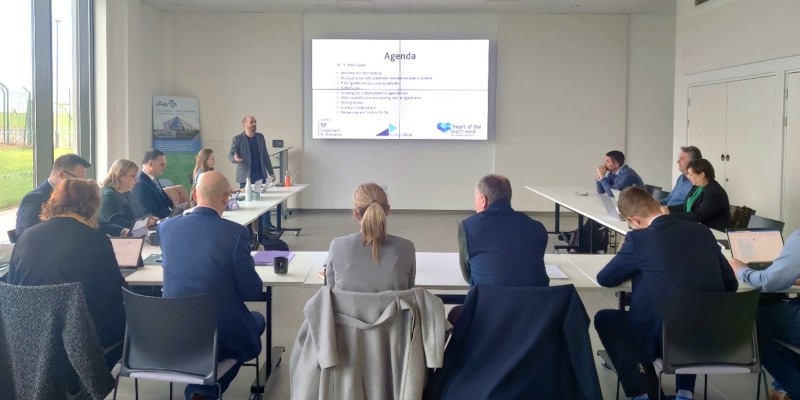
The South West needs to plan for the future to remain globally competitive and take advantage of technological change for efficiency and productivity.
That was the focus of discussion at a recent roundtable of key players from the Aerospace and Advanced Engineering sector, facilitated by Business West in partnership with Heart of the South West Local Enterprise Partnership Sustainable Aviation Board, Leonardo and Yeovil College.
In this session, we investigated how industry needs may change as technologies incorporate more of the potential of industry 4.0* and digitalisation.
*If you’re unfamiliar with the term ‘industry 4.0’, Shona Wright, Author at TechSPARK, has written a piece defining this term, "otherwise known as the fourth industrial revolution", and its implications for the South West.
Attendance for this important roundtable event, facilitated by Matt Tudge, Project Manager for the region’s Local Skills Improvement Plan, included key players from a variety of Aerospace and Advanced Engineering firms, training providers and stakeholders in the West of England Plus region. Moving around the table, the conversation focused on how best to incorporate digitalisation into future workforce needs and how we can ensure that it is relevant to companies across the entire supply chain.
Discussions progressed to debate whether ‘digitalisation’ or ‘industry 4.0’ are indeed useful terms to describe these technological shifts.
Throughout the morning, we heard from West of England Aerospace Forum (WEAF), Digital Engineering Technology and Innovation (DETI), Yeovil College and Leonardo on research and projects they had undertaken and how we can use the findings meaningfully to benefit us as a wider aerospace cluster in terms of business growth and upskilling our workforce.
Mark Bolton, CEO and Principal of Yeovil College, highlighted the importance of being able to set out a meaningful statement on what we, as a collaborative group, may want to achieve. Our ‘why statement’. The room agreed that we must be able to ‘plan for the future to remain globally competitive, and take advantage of technological change for efficiency and productivity’.
Colin Turner, Chief Executive – West of England Aerospace Forum (WEAF) explained their supply chain issues. Regional aerospace primes are ramping up to 75 aircrafts per month, but we have 30% less skill in our supply chain to deliver this. There’s a dependence on those 75 aircraft a month but existing skills are stretched.
Key points noted were: the South West is a large region to teach people across; digitalisation is not just about what industry needs but how you teach it; and digitalisation in terms of skills level is about driving change within skills rather than teaching a specific hardware.
An example that resonated with many in the delegation was Chief of Staff at Leonardo, Tania Bartlett’s presentation of Leonardo’s plans and ambitions for digitalisation internally. Tania shared their plans to address the impacts and benefits across all departments, from the value of changes to internal and external communications that came about due to the pandemic, as well as the incorporation of simulation and virtual testing applications.
Conversation continued right up until lunch, with an agreement to continue the discussion to tie together how our region and cluster can incorporate these facets of digitalisation for planning future activities.
Key points which drew consensus over the course of the day were:
- The need for flexible, accessible technical training which the geographically distributed workforce could access.
- The need for ‘Business Enterprise Systems’ training and further standardisation of those systems which would bring much benefit in the efficiency agenda.
- The need for digital ‘production’ training - which will require further exploration to define what this means for the SME and Prime businesses in terms of differentiated solutions.
After the next round of discussions, the event facilitators will produce a short analysis, summarising key points from both events, to help guide the future growth of the sector and the support for businesses.
This will be fed into the research for the West of England Plus LSIP, one of eight Department for Education trailblazers, ensuring businesses are at the heart of shaping technical training delivery to better reflect the needs of the region’s businesses.
Are you interested in hearing more? Or would you like to contribute to the West of England Plus LSIP, to help shape the future skills landscape in aerospace?
You can get involved with the LSIP by contacting Matt or visiting the LSIP portal.
- Log in to post comments
See our LSIP video reel
To find out more about LSIP, check out our video reel on YouTube:
